Module 3 Journey to space Unit 3 Language in use 课件35张PPT
文档属性
| 名称 | Module 3 Journey to space Unit 3 Language in use 课件35张PPT |
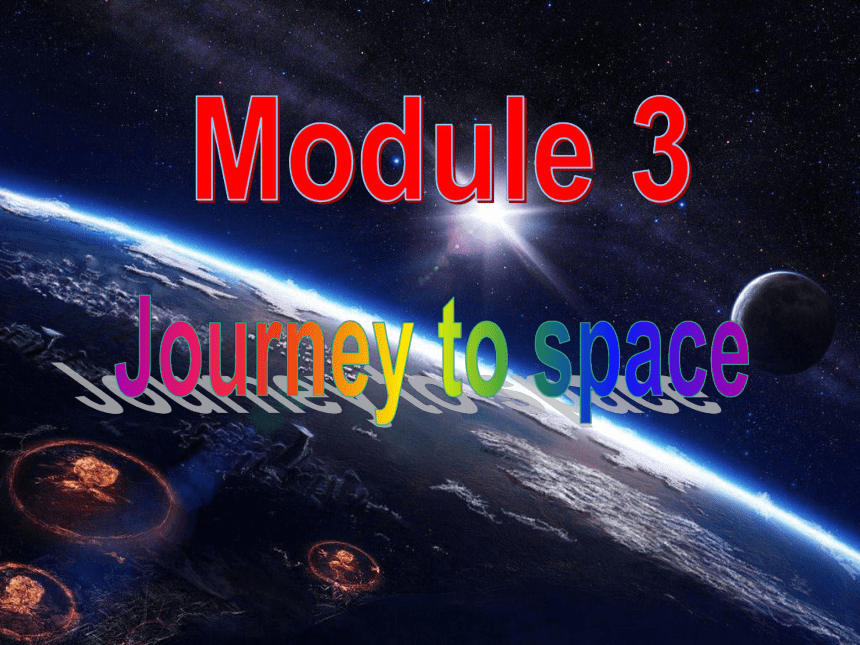
|
|
| 格式 | ppt | ||
| 文件大小 | 4.3MB | ||
| 资源类型 | 教案 | ||
| 版本资源 | 外研版 | ||
| 科目 | 英语 | ||
| 更新时间 | 2019-02-15 00:00:00 | ||
图片预览


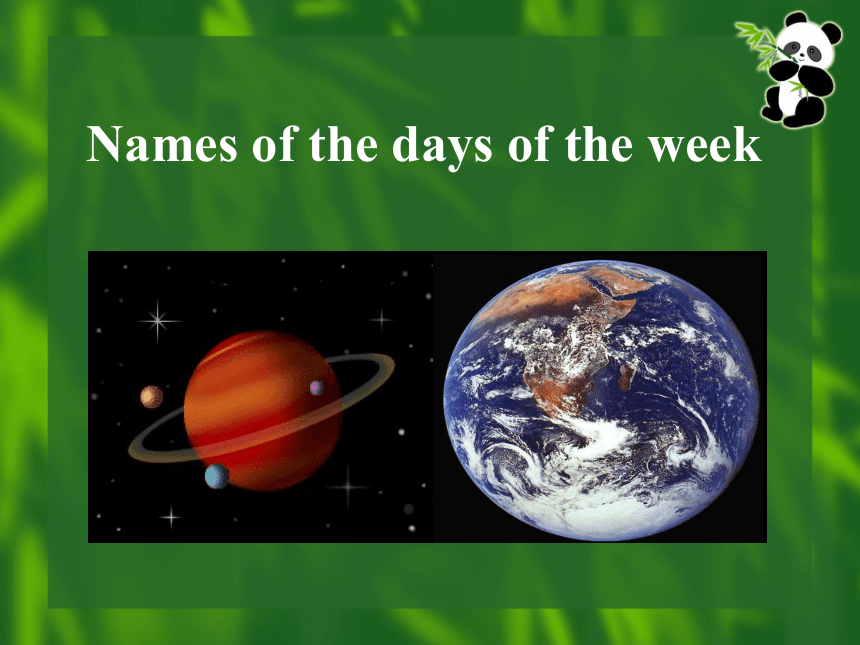
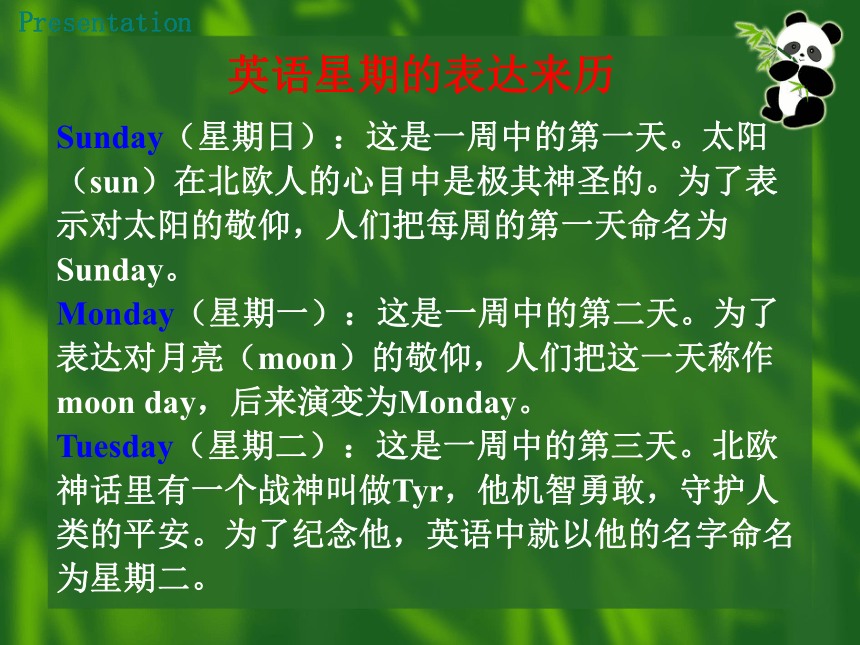
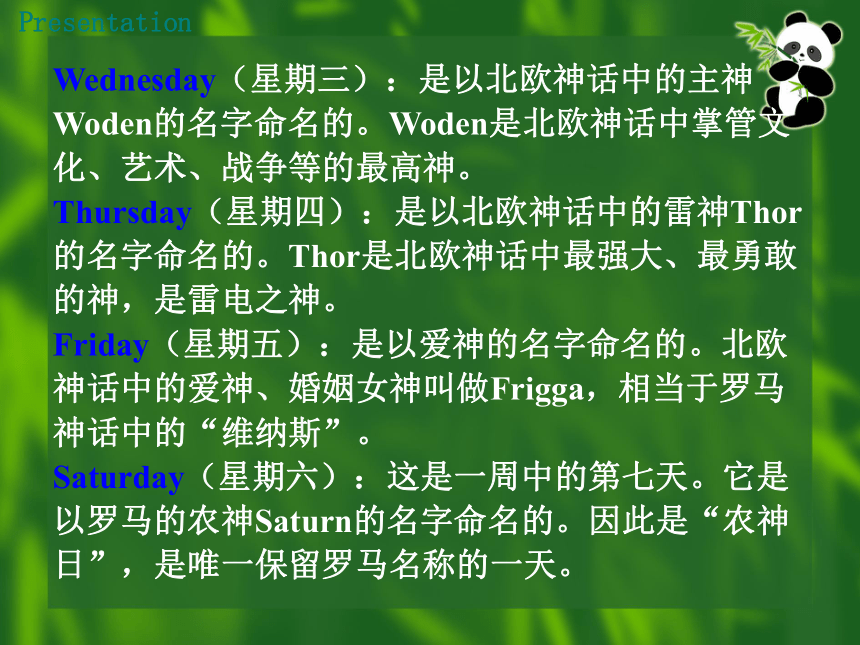

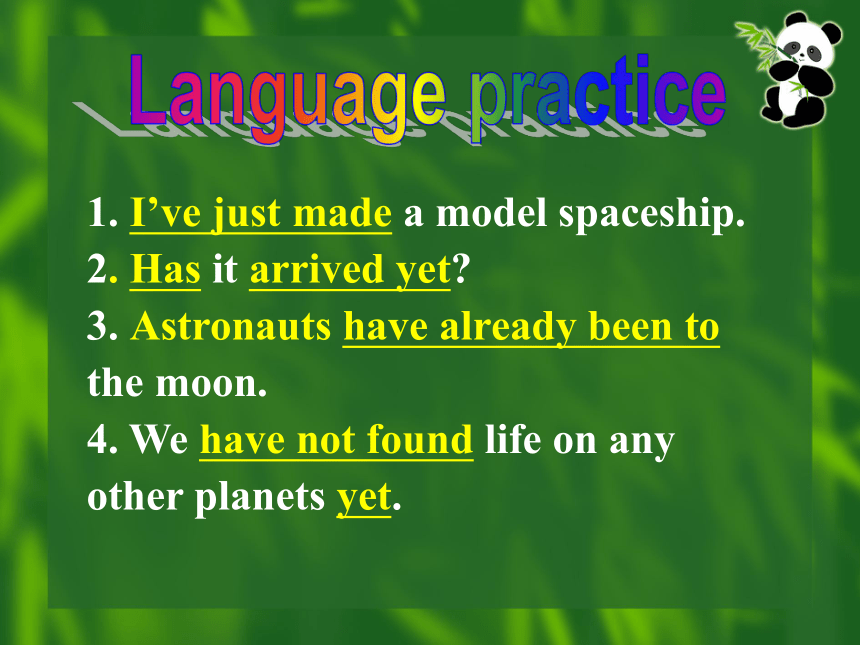
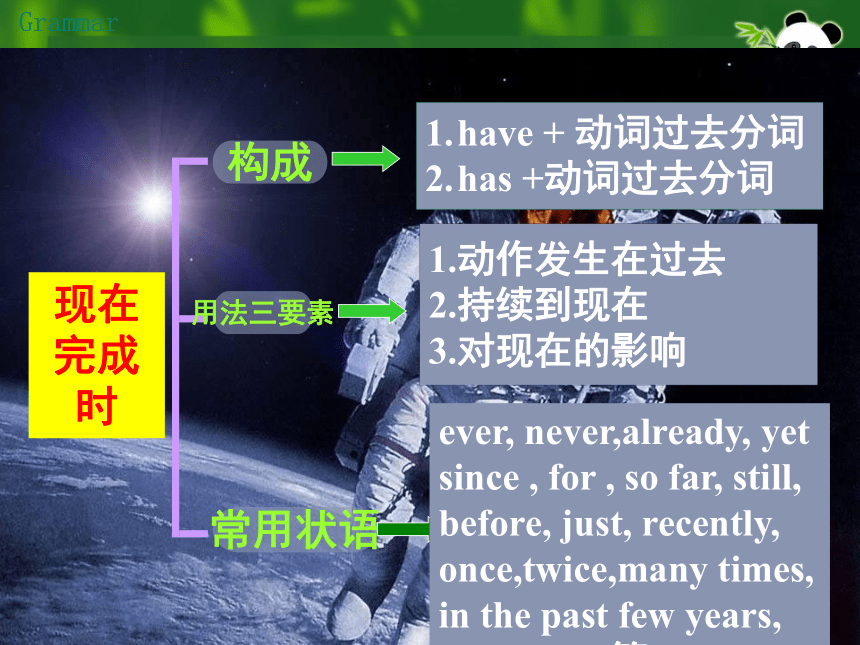
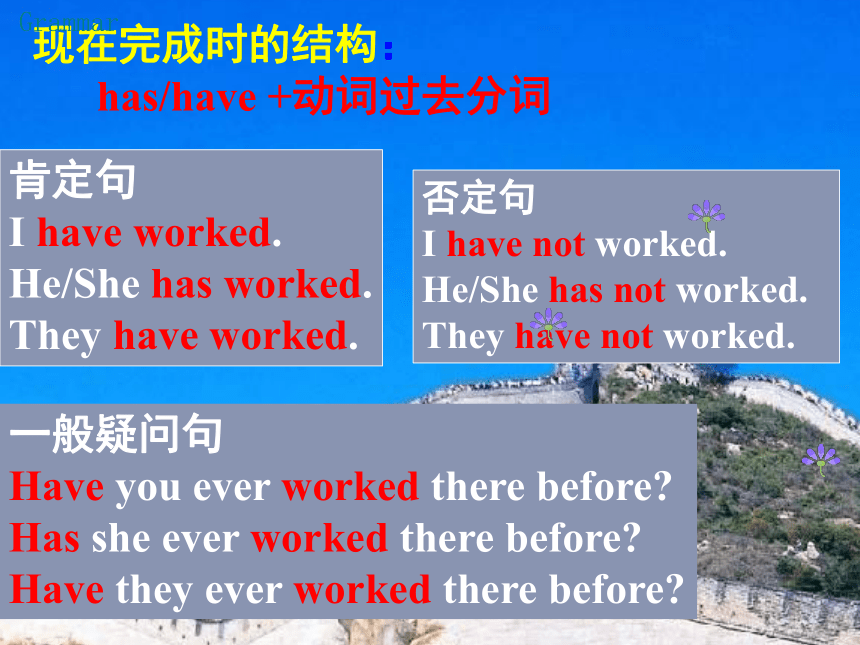
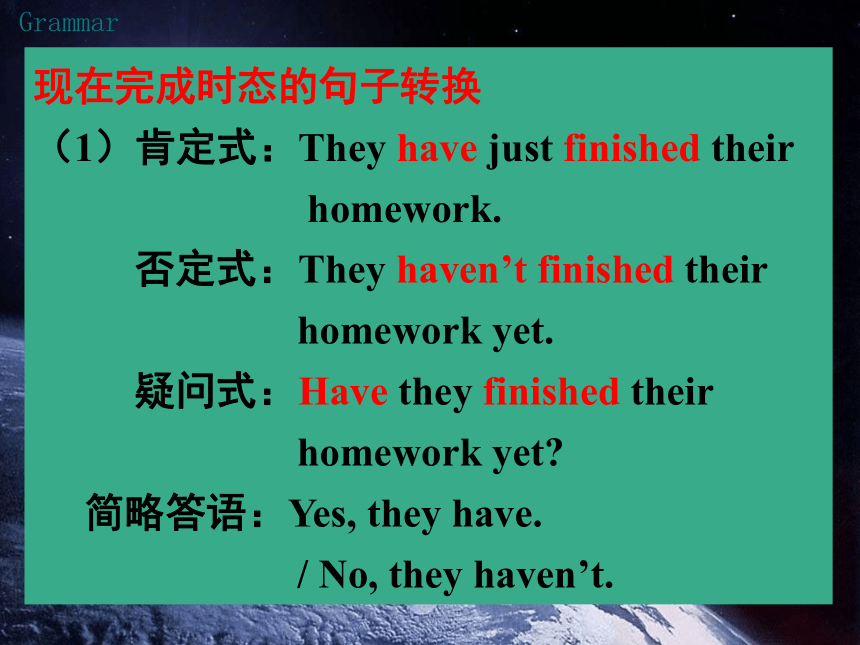
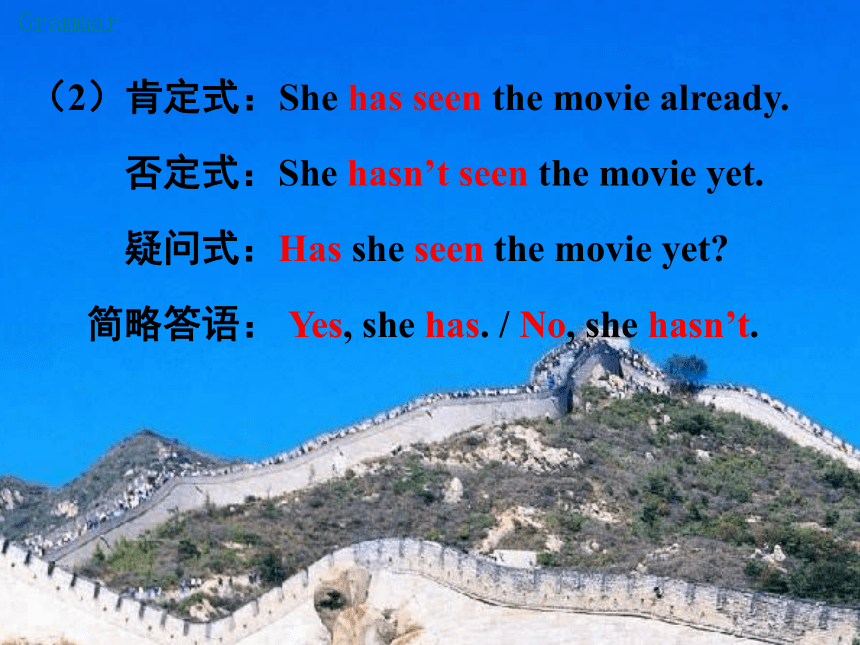
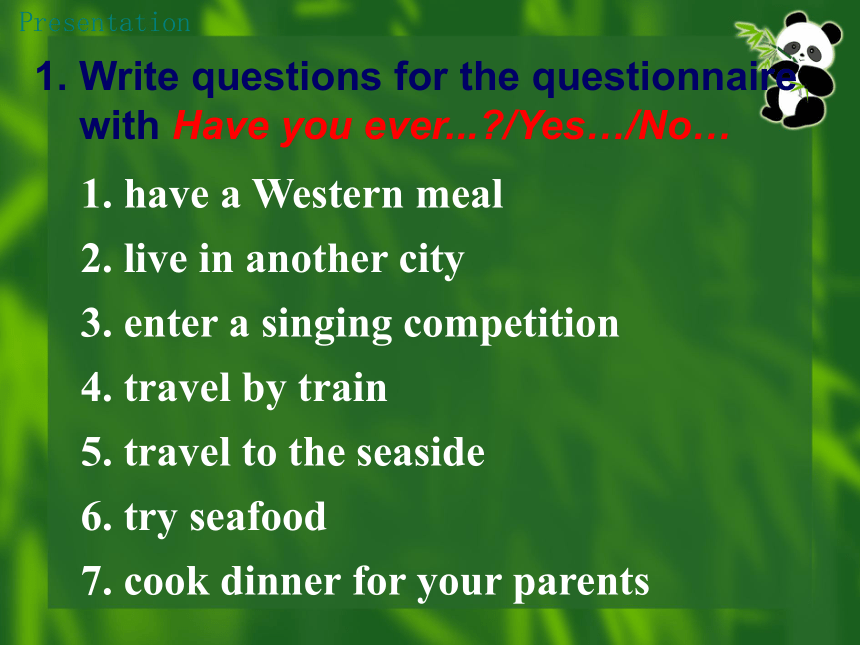
文档简介
(共35张PPT)
Names of the days of the week
Sunday(星期日):这是一周中的第一天。太阳(sun)在北欧人的心目中是极其神圣的。为了表示对太阳的敬仰,人们把每周的第一天命名为Sunday。
Monday(星期一):这是一周中的第二天。为了表达对月亮(moon)的敬仰,人们把这一天称作moon day,后来演变为Monday。
Tuesday(星期二):这是一周中的第三天。北欧神话里有一个战神叫做Tyr,他机智勇敢,守护人类的平安。为了纪念他,英语中就以他的名字命名为星期二。
英语星期的表达来历
Presentation
Wednesday(星期三):是以北欧神话中的主神Woden的名字命名的。Woden是北欧神话中掌管文化、艺术、战争等的最高神。
Thursday(星期四):是以北欧神话中的雷神Thor的名字命名的。Thor是北欧神话中最强大、最勇敢的神,是雷电之神。
Friday(星期五):是以爱神的名字命名的。北欧神话中的爱神、婚姻女神叫做Frigga,相当于罗马神话中的“维纳斯”。
Saturday(星期六):这是一周中的第七天。它是以罗马的农神Saturn的名字命名的。因此是“农神日”,是唯一保留罗马名称的一天。
Presentation
学习目标:
1.复习现在完成时的用法。
2.掌握already,just和yet的用法。
3.掌握have/has been to和have/has gone to 的用法
1. I’ve just made a model spaceship.
2. Has it arrived yet
3. Astronauts have already been to the moon.
4. We have not found life on any other planets yet.
构成
用法三要素
常用状语
have + 动词过去分词
has +动词过去分词
1.动作发生在过去
2.持续到现在
3.对现在的影响
现在完成时
Grammar
ever, never,already, yet
since , for , so far, still,
before, just, recently,
once,twice,many times,
in the past few years,
up to now 等
现在完成时的结构:
has/have +动词过去分词
肯定句
I have worked.
He/She has worked.
They have worked.
否定句
I have not worked.
He/She has not worked.
They have not worked.
Grammar
一般疑问句
Have you ever worked there before
Has she ever worked there before
Have they ever worked there before
现在完成时态的句子转换
(1)肯定式:They have just finished their
homework.
否定式:They haven’t finished their
homework yet.
疑问式:Have they finished their
homework yet
简略答语:Yes, they have.
/ No, they haven’t.
Grammar
(2)肯定式:She has seen the movie already.
否定式:She hasn’t seen the movie yet.
疑问式:Has she seen the movie yet
简略答语: Yes, she has. / No, she hasn’t.
Grammar
1. have a Western meal
2. live in another city
3. enter a singing competition
4. travel by train
5. travel to the seaside
6. try seafood
7. cook dinner for your parents
Write questions for the questionnaire
with Have you ever... /Yes…/No…
Presentation
have/has been to与have/has gone to的区别:
have/has been to表示某人“去过某地,现在已经回来了”。
have/has gone to表示某人“去某地了”,这个人已经不在这里了。
No one has been to Mars yet, because Mars is very far away, much farther than the moon.
Astronauts have already been to the moon.
The spaceship has gone to Mars.
It has gone there, but it has not come back yet.
Astronauts have been to the moon. They went there and then they came back.
Look at these sentences.
1. Astronauts have been / gone to the
moon and returned.
2. The spaceship has been / gone into
space. It will travel for ten days.
3. The astronaut has been / gone to the
space station. He will come back
tomorrow.
4. The spaceship has been / gone to the
space station. It brought back two
astronauts.
Now choose the correct answer.
Complete the sentences with the expressions in the box.
have / has been
have / has gone
Eg. A spaceship ____________ to Mars. It is coming back to the earth next year.
has gone
1. Lots of astronauts ___________ to the space station. They found it very interesting.
2. Some astronauts ____________ to the moon twice.
3. Two British astronauts ____________ to the space station. They will come back in January.
have been
have been
have gone
already , just , yet
当表示动作已经完成,并对现在有一定影响时,我们一般用现在完成时。同时,可分用just, already或yet加以强调或说明。例如:
I have just heard the news.
我刚听到消息。
Grammar
Astronauts have already been to the moon. 宇航员已经去过月球了。
He has just started to explore other planets. 我们才刚刚开始探索其他行星。
可以看出,just用来表示“刚刚”, already用来表示“已经”,两者都用于肯定句中,一般是置于have / has之后。在否定句中则可用yet, 表示“还未”, 有“以后可以会”的含义。
Grammar
Spaceship on Mars!
Astronauts have (1) ________ been to the moon but they have not been to any other planets. However, a spaceship (2) _______ arrived on Mars and it has (3) _______ sent back photos of the red planet. Is there life on Mars We do not know (4) ________.
already
just
already
yet
Complete the news with already, just and yet.
现在完成时与一般过去时的比较
另外,在使用现在完成时的时候,要注意与一般过去时的区别。现在完成时在表达经历时只表示该事件是在现在之前的某一个时间里发生的,重点在于已完成动作对现在的影响。
Grammar
而一般过去时则表示在过去某一具体时间发生的事情。例如:
I have just been to London. I went there last month.
我刚去过伦敦,上个月去的。
I have already finished my homework. I finished it an hour ago.
我已经完成家庭作业了,一小时前完成的。
Grammar
在没有明确的过去时间状语时,如何判断该用现在完成时还是该用过去时呢?判断的标准是看该行为是否对现在有影响,也就是说该句强调的是什么。试看以下对话:
A: Where have you put my book
I can’t find it.
你把我的书放哪儿去了?我找不到。
Grammar
B: I put it on your desk yesterday.
我昨天放你桌子上了。
该对话中,当A 问对方把自己的书放在何处时,A 感兴趣的是现在的状态,因此用现在完成时。但是B 回答时只是说明当时放的位置,所以用一般过去时。再看下面的对话:
A: Would you like to go and see the film with me tonight 你今晚想和我去看电影吗?
B: Sorry, I have seen it already. 不好意思,我已经看过那部电影了。
对话中的现在完成时表示对结果的强调:“电影看过了,所以不想再看了。
1) have a Western meal
Have you ever had a Western meal
2) live in another city
Have you ever lived in another city
3) enter a singing competition
Have you ever entered a singing competition
4) travel by train
Have you ever travelled by train
5) travel to the seaside
Have you ever travelled to the seaside
6) try seafood
Have you ever tried seafood
Finish a questionnaire about your classmates’ experiences.
Names of the days of the week
Sunday(星期日):这是一周中的第一天。太阳(sun)在北欧人的心目中是极其神圣的。为了表示对太阳的敬仰,人们把每周的第一天命名为Sunday。
Monday(星期一):这是一周中的第二天。为了表达对月亮(moon)的敬仰,人们把这一天称作moon day,后来演变为Monday。
Tuesday(星期二):这是一周中的第三天。北欧神话里有一个战神叫做Tyr,他机智勇敢,守护人类的平安。为了纪念他,英语中就以他的名字命名为星期二。
英语星期的表达来历
Presentation
Wednesday(星期三):是以北欧神话中的主神Woden的名字命名的。Woden是北欧神话中掌管文化、艺术、战争等的最高神。
Thursday(星期四):是以北欧神话中的雷神Thor的名字命名的。Thor是北欧神话中最强大、最勇敢的神,是雷电之神。
Friday(星期五):是以爱神的名字命名的。北欧神话中的爱神、婚姻女神叫做Frigga,相当于罗马神话中的“维纳斯”。
Saturday(星期六):这是一周中的第七天。它是以罗马的农神Saturn的名字命名的。因此是“农神日”,是唯一保留罗马名称的一天。
Presentation
学习目标:
1.复习现在完成时的用法。
2.掌握already,just和yet的用法。
3.掌握have/has been to和have/has gone to 的用法
1. I’ve just made a model spaceship.
2. Has it arrived yet
3. Astronauts have already been to the moon.
4. We have not found life on any other planets yet.
构成
用法三要素
常用状语
have + 动词过去分词
has +动词过去分词
1.动作发生在过去
2.持续到现在
3.对现在的影响
现在完成时
Grammar
ever, never,already, yet
since , for , so far, still,
before, just, recently,
once,twice,many times,
in the past few years,
up to now 等
现在完成时的结构:
has/have +动词过去分词
肯定句
I have worked.
He/She has worked.
They have worked.
否定句
I have not worked.
He/She has not worked.
They have not worked.
Grammar
一般疑问句
Have you ever worked there before
Has she ever worked there before
Have they ever worked there before
现在完成时态的句子转换
(1)肯定式:They have just finished their
homework.
否定式:They haven’t finished their
homework yet.
疑问式:Have they finished their
homework yet
简略答语:Yes, they have.
/ No, they haven’t.
Grammar
(2)肯定式:She has seen the movie already.
否定式:She hasn’t seen the movie yet.
疑问式:Has she seen the movie yet
简略答语: Yes, she has. / No, she hasn’t.
Grammar
1. have a Western meal
2. live in another city
3. enter a singing competition
4. travel by train
5. travel to the seaside
6. try seafood
7. cook dinner for your parents
Write questions for the questionnaire
with Have you ever... /Yes…/No…
Presentation
have/has been to与have/has gone to的区别:
have/has been to表示某人“去过某地,现在已经回来了”。
have/has gone to表示某人“去某地了”,这个人已经不在这里了。
No one has been to Mars yet, because Mars is very far away, much farther than the moon.
Astronauts have already been to the moon.
The spaceship has gone to Mars.
It has gone there, but it has not come back yet.
Astronauts have been to the moon. They went there and then they came back.
Look at these sentences.
1. Astronauts have been / gone to the
moon and returned.
2. The spaceship has been / gone into
space. It will travel for ten days.
3. The astronaut has been / gone to the
space station. He will come back
tomorrow.
4. The spaceship has been / gone to the
space station. It brought back two
astronauts.
Now choose the correct answer.
Complete the sentences with the expressions in the box.
have / has been
have / has gone
Eg. A spaceship ____________ to Mars. It is coming back to the earth next year.
has gone
1. Lots of astronauts ___________ to the space station. They found it very interesting.
2. Some astronauts ____________ to the moon twice.
3. Two British astronauts ____________ to the space station. They will come back in January.
have been
have been
have gone
already , just , yet
当表示动作已经完成,并对现在有一定影响时,我们一般用现在完成时。同时,可分用just, already或yet加以强调或说明。例如:
I have just heard the news.
我刚听到消息。
Grammar
Astronauts have already been to the moon. 宇航员已经去过月球了。
He has just started to explore other planets. 我们才刚刚开始探索其他行星。
可以看出,just用来表示“刚刚”, already用来表示“已经”,两者都用于肯定句中,一般是置于have / has之后。在否定句中则可用yet, 表示“还未”, 有“以后可以会”的含义。
Grammar
Spaceship on Mars!
Astronauts have (1) ________ been to the moon but they have not been to any other planets. However, a spaceship (2) _______ arrived on Mars and it has (3) _______ sent back photos of the red planet. Is there life on Mars We do not know (4) ________.
already
just
already
yet
Complete the news with already, just and yet.
现在完成时与一般过去时的比较
另外,在使用现在完成时的时候,要注意与一般过去时的区别。现在完成时在表达经历时只表示该事件是在现在之前的某一个时间里发生的,重点在于已完成动作对现在的影响。
Grammar
而一般过去时则表示在过去某一具体时间发生的事情。例如:
I have just been to London. I went there last month.
我刚去过伦敦,上个月去的。
I have already finished my homework. I finished it an hour ago.
我已经完成家庭作业了,一小时前完成的。
Grammar
在没有明确的过去时间状语时,如何判断该用现在完成时还是该用过去时呢?判断的标准是看该行为是否对现在有影响,也就是说该句强调的是什么。试看以下对话:
A: Where have you put my book
I can’t find it.
你把我的书放哪儿去了?我找不到。
Grammar
B: I put it on your desk yesterday.
我昨天放你桌子上了。
该对话中,当A 问对方把自己的书放在何处时,A 感兴趣的是现在的状态,因此用现在完成时。但是B 回答时只是说明当时放的位置,所以用一般过去时。再看下面的对话:
A: Would you like to go and see the film with me tonight 你今晚想和我去看电影吗?
B: Sorry, I have seen it already. 不好意思,我已经看过那部电影了。
对话中的现在完成时表示对结果的强调:“电影看过了,所以不想再看了。
1) have a Western meal
Have you ever had a Western meal
2) live in another city
Have you ever lived in another city
3) enter a singing competition
Have you ever entered a singing competition
4) travel by train
Have you ever travelled by train
5) travel to the seaside
Have you ever travelled to the seaside
6) try seafood
Have you ever tried seafood
Finish a questionnaire about your classmates’ experiences.
同课章节目录
- Module 1 Feelings and impressions
- Unit 1 It smells delicious.
- Unit 2 I feel nervous when I speak Chinese .
- Unit 3 Language in use
- Module 2 Experiences
- Unit 1 I've also entered lots of speaking competi
- Unit 2 They have seen the Pyramids.
- Unit 3 Language in use
- Module 3 Journey to space
- Unit 1 Has it arrived yet?
- Unit 2 We have not found life on any other planet
- Unit 3 Language in use
- Module 4 Seeing the docto
- Unit 1 I haven't done much exercise since I got m
- Unit 2 We have played football for a year now
- Unit 3 Language in use
- Module 5 Cartoons
- Unit 1 It's time to watch a cartoon.
- Unit 2 Tintin has been popular for over eighty yea
- Unit 3 Language in use
- Revision module A
- Module 6 Hobbies
- Unit 1 Do you collect anything ?
- Unit 2 Hobbies can make you grow as a person.
- Unit 3 Language in use
- Module 7 Summer in Los Angeles
- Unit 1 Please write to me and send me some photos
- Unit 2 Fill out a form and come to learn English
- Unit 3 Language in use
- Module 8 Time off
- Unit 1 I can hardly believe we are in the city ce
- Unit 2 We thought somebody was moving about
- Unit 3 Language in use
- Module 9 Friendship
- Unit 1 Could I ask if you've mentioned this to he
- Unit 2 I believe that the world is what you think
- Unit 3 Language in use
- Module 10 On the radio
- Unit 1 I hope that you can join us one day
- Unit 2 It seemed that they were speaking to me in
- Unit 3 Language in use
- Revision module B
